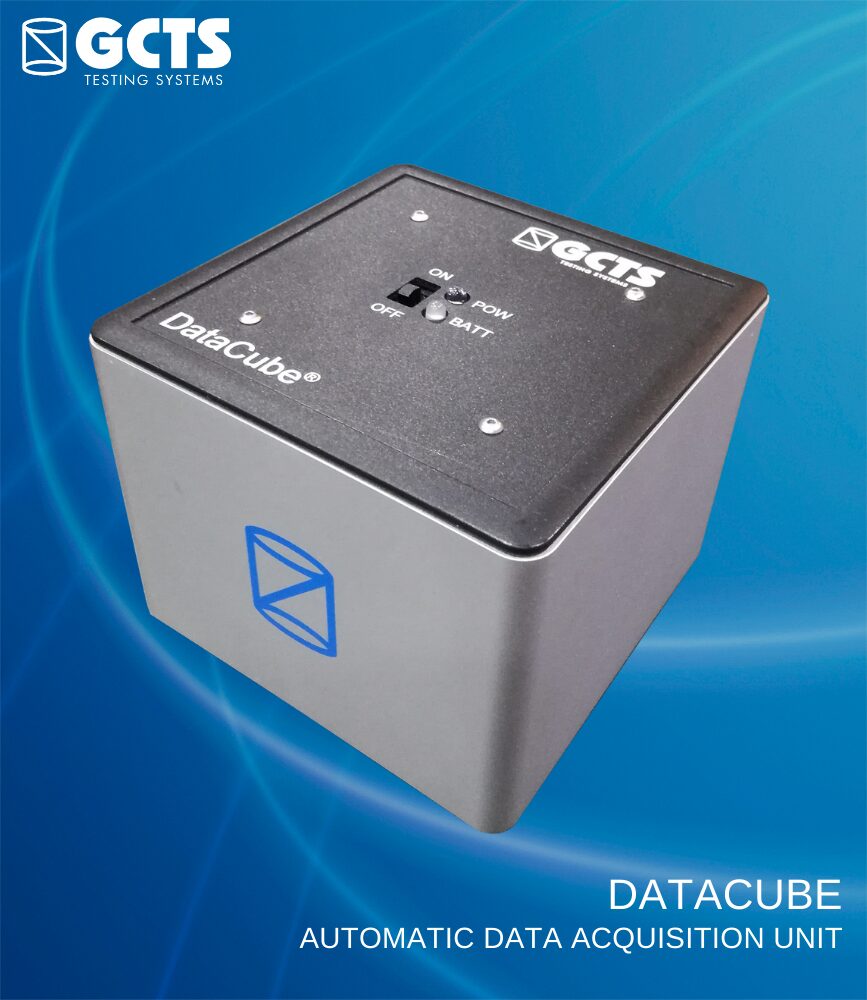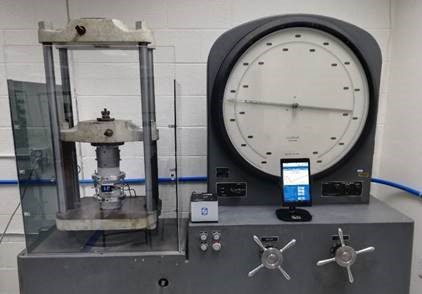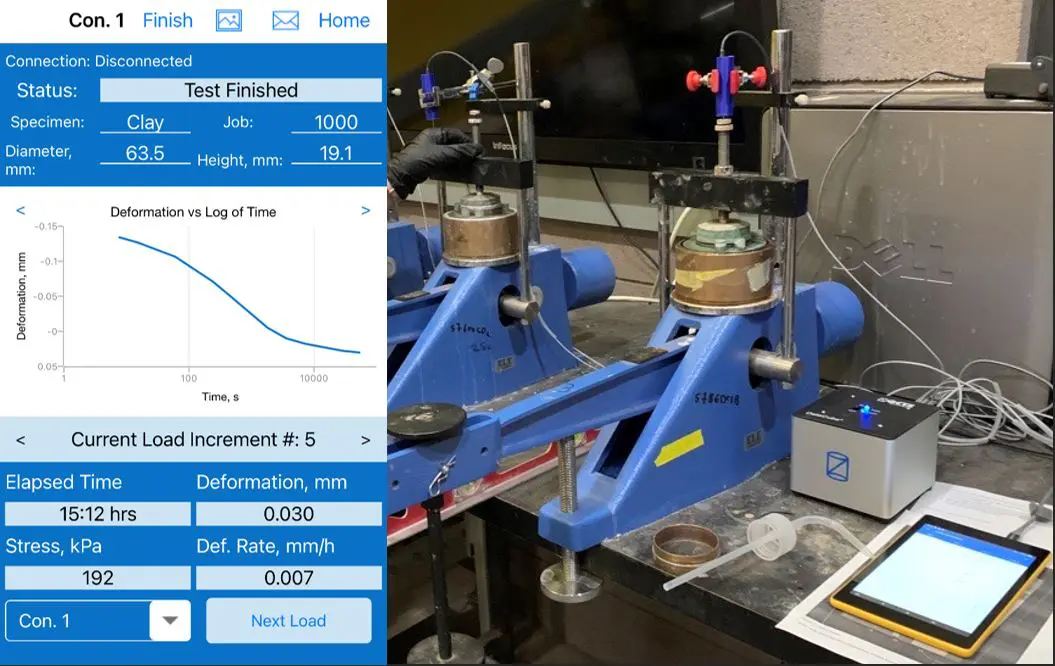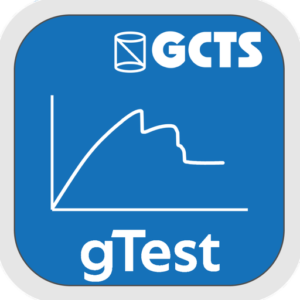DataCube
The GCTS DataCube is a four-channel, wireless data acquisition unit. This system can accept load cells, pressure transducers, LVDTs, or other analog input signals (strain gages and AC sensors require signal conditioning, sold separately). Each channel features digital offset and gain, 16-bit resolution, and an anti-alias filter.
A wireless device (Android, Apple, or Windows) must be connected to the DataCube via a wireless connection to begin recording data. Once the DataCube begins recording data, the user can disconnect their device. At any time, the user can reconnect their device to view current data or, when the test is over, collect all recorded data. This is ideal for long-term tests as the user will not need to be at the system constantly taking readings. The data can then be easily sent to an email in a spreadsheet attachment.
Various mobile applications are available for specific tests, including consolidation, direct shear, indirect tension, point load, and unconfined compressive strength. A complete list of applications are shown below, and custom apps can be developed. Please contact GCTS for more details.
DataCube
HIGHLIGHTS
- 16-bit (±0.003%) resolution.
- Four (4) total sensor inputs for strain gages, load cells, pressure transducers, temperature sensors, etc.
- 0-5 VDC Input, 12 VDC and 5 VDC excitation (signal conditioning sold separately)
- Internal storage for up to 10,000 data points per input channel
- 100 samples per second maximum acquisition rate
- ± 0.0025% F.S typical temperature stability
- 0°C to +50°C operation temperature range
- 5 VDC Power at 500 mA using Micro USB or four internal replaceable AA batteries. External LiPo batteries available for continuous field operation
- Communicates with wireless devices
- Universal Data Acquisition software compatible with iOS (8+), Android (4.4+), and Windows 10 (FCU Version 1709+) devices. Includes continuous or circular data buffers and time/level crossing data acquisition
- Does not require continuous monitoring; mobile device can be disconnected and DataCube will continue to collect data until test parameters are satisfied
List of Applications
Current list of applications:
- California Bearing Ratio (CBR) of Laboratory-Compacted Soils (ASTM D1883 and AASHTO T193)
- Compressive Strength and Elastic Moduli of Intact Rock Core Specimens under Varying States of Stress and Temperatures (ASTM D7012)
- Consolidated Drained Triaxial Compression Test for Soils (ASTM D7181)
- Consolidated Undrained Direct Simple Shear Testing of Fine Grain Soils (ASTM D6528)
- Consolidated Undrained Triaxial Compression Test for Cohesive Soils (ASTM D4767)
- Creep of Concrete in Compression (ASTM C512)
- Creep of Rock Core Under Constant Stress and Temperature (ASTM D7070)
- Direct Shear Strength Tests of Rock Specimens Under Constant Normal Force (ASTM D5607)
- Direct Tensile Strength of Intact Rock Core Specimens (ASTM D2936)
- Flexural Strength of Concrete Using Simple Beam with Center-Point Loading (ASTM C293)
- Flexural Strength of Concrete Using Simple Beam with Third-Point Loading (ASTM C78)
- Flexural Strength of Soil-Cement Using Simple Beam with Third-Point Loading (ASTM D1635)
- Liquid Limit, Plastic Limit, and Plasticity Index of Soils (ASTM D4318)
- Marshall Stability and Flow of Asphalt Mixtures (ASTM D6927, ASTM D5581 and AASHTO T245)
- One-Dimensional Consolidation Properties of Soils Using Incremental Loading (ASTM D2435 and AASHTO T216)
- One-Dimensional Swell or Collapse of Soils (ASTM D4546)
- Point Load Strength Index of Rock and Application to Rock Strength Classifications (ASTM D5731)
- Splitting Tensile Strength of Cylindrical Concrete Specimens (ASTM C496)
- Splitting Tensile Strength of Intact Rock Core Specimens (ASTM D3967)
- Static Modulus of Elasticity and Poisson’s Ratio of Concrete in Compression (ASTM C469)
- Triaxial Compression Creep Strength of Chemically Grouted Soils (ASTM D5202)
- Unconfined Compressive Strength of Cohesive Soil (ASTM D2166)
- Unconfined Compressive Strength of Compacted Soil-Lime Mixture (ASTM D5102)
- Unconsolidated-Undrained Triaxial Compression Test on Cohesive Soil (ASTM D2850)
Consolidation App
DESCRIPTION
The soil consolidation apparatus (consolidometer) used to perform the oedometer test is a quintessential laboratory device for any geotechnical testing laboratory and has largely stayed unchanged since its introduction. GCTS has developed a simple data acquisition unit with an app to bring the consolidometer apparatus into the digital age. The DataCube unit with a deformation sensor can monitor and record the specimen deformation after the load has been applied, eliminating the need for the manual recording. The consolidation app saves and plots the data which can be emailed with a touch of a button.
How does it work?
The analog dial gauge on the consolidometer is replaced by a DC type deformation sensor which is then connected to the DataCube unit. One DataCube can accommodate up to four (4) deformation sensors, so a single unit can upgrade up to four (4) consolidometers. The consolidation app on a mobile device (Android, iOS, or Windows) is connected wirelessly to the DataCube to begin recording the data. After each load increment is applied the app records and processes the data. At the end of the test, the mobile device can be re-connected to the DataCube to download and email the test results.







